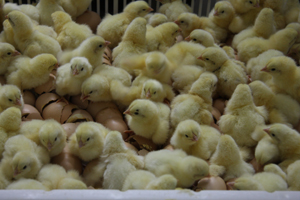Incubation temperature profiles affect broiler feathering

Feathers affect thermoregulation and protect skin from litter contact and scratches from other broilers. Previous results have indicated that breeder feed restriction programmes and incubation may affect integumentary tissue development in broiler progeny.
In one experiment, the number of feather follicles was counted to determine possible carryover effects of breeder feed restriction programmes and incubation temperatures on feather density of progeny at 22 days of age. Cobb 500 fast feathering breeders were subjected to two dietary feed restriction programmes during rearing: “skip a day” and “every day feeding”. Eggs from each group were collected at 60 weeks and randomly divided and incubated according to two incubation temperature profiles: standard eggshell temperature (38.1°C) and “early-low late-high”.
This second profile had low (36.9°C) eggshell temperature during the first three days and standard temperature until the last three days when eggs endured elevated (38.9°C) eggshell temperature. Seventy two chicks per treatment were randomly selected, placed in 48 Petersime cages (6/cage) and raised to 22 days. Body weights were recorded and two chickens per cage were sampled for skin in breast, dorsum and thigh areas. Data of the samples were analysed with breeder feed restriction and temperature profile as main factors and 12 cages/treatment.
Results indicated an interaction effect on feather follicle numbers in the dorsum area. Progeny from breeders under “skip a day” had more feather follicles when incubated under “early low late high” conditions. No effect of incubation was observed on progeny of every day feeding. The “early-low late-high” incubation also increased feather follicles in the thigh independently of breeder treatment. In the breast area, chickens incubated under standard conditions had more feather follicles than those from “early-low late-high” treatment independently of breeder treatment. These findings may be applied to minimise carcass scratches and improve broiler welfare. It was concluded that incubation temperature affect feathering development, and this effect may be stronger in progeny from breeders feed restricted under “skip-a-day” programmes.
Source: Jenna Scott, Manuel J. Da Costa, Edgar O. Oviedo-Rondón, Prestage Department of Poultry Science, North Carolina State University, Raleigh, NC, USA
Proceedings of the 2014 International Poultry Scientific Forum, Atlanta, GA, USA













